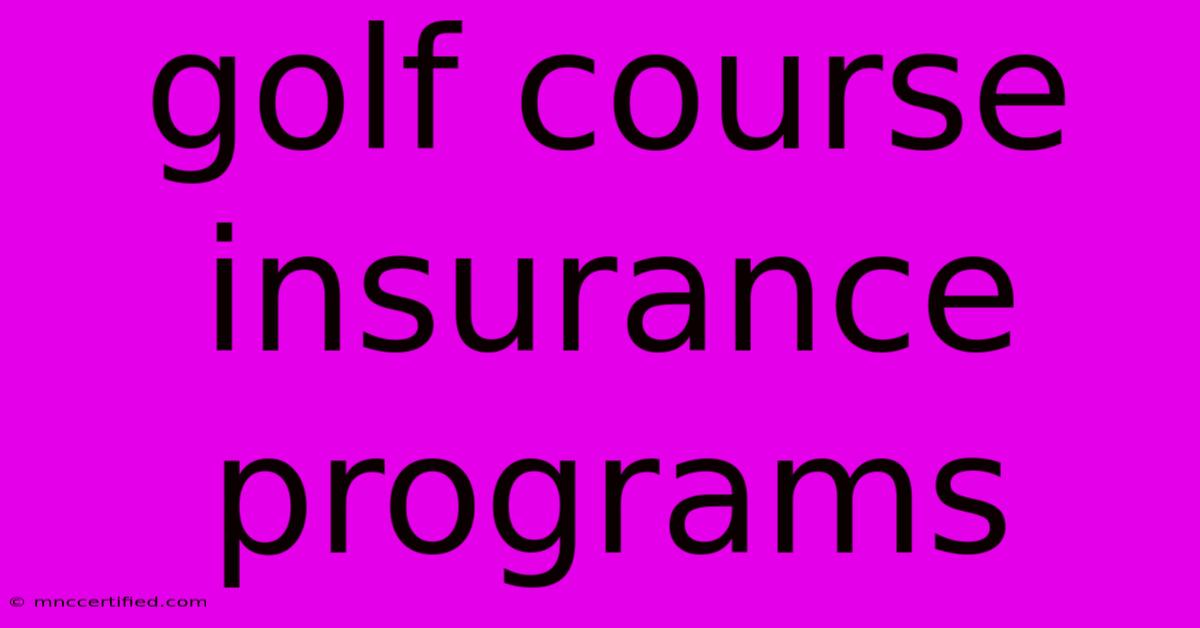Golf Course Insurance Programs

Table of Contents
Golf Course Insurance Programs: A Comprehensive Guide
Protecting your golf course is crucial. From unexpected accidents to costly property damage, the risks are significant. This comprehensive guide explores the essential golf course insurance programs you need to safeguard your business and its assets. We'll delve into the types of coverage, key considerations, and how to find the best policy for your needs.
Understanding the Unique Risks of Golf Course Operations
Golf courses face a unique set of risks compared to other businesses. These risks can be broadly categorized into:
1. Liability Risks:
- Bodily Injury: Golf carts accidents, slips, trips, and falls on the course, injuries caused by errant golf balls – these are common occurrences that can lead to substantial liability claims.
- Property Damage: Damage to players' golf equipment, personal property damage, and damage to neighboring properties from errant shots or course maintenance activities.
- Professional Liability (Errors & Omissions): This covers claims arising from professional services provided by your staff, such as course design or instruction.
2. Property Risks:
- Building Damage: Damage to the clubhouse, pro shop, maintenance sheds, and other structures due to fire, weather events (hail, wind, floods), or vandalism.
- Course Damage: Damage to the golf course itself, including greens, fairways, bunkers, and irrigation systems, from natural disasters or vandalism.
- Equipment Damage: Damage to golf carts, mowing equipment, and other machinery used for course maintenance.
3. Other Important Risks:
- Workers' Compensation: This is crucial to cover medical expenses and lost wages for employees injured on the job.
- Cyber Liability: Protects against data breaches and other cyber-related incidents that can impact your operations and reputation.
- Business Interruption: Covers lost income if your course is temporarily shut down due to an insured event.
Key Types of Golf Course Insurance Programs
To mitigate these risks, you'll need a comprehensive insurance program. Here are the key components:
1. General Liability Insurance:
This is the cornerstone of any golf course insurance program. It protects you against claims of bodily injury or property damage caused by your operations. This is absolutely essential.
2. Property Insurance:
This protects your physical assets, including buildings, equipment, and the course itself, against damage from various perils. Consider separate coverage for buildings and equipment for optimal protection.
3. Umbrella Liability Insurance:
This provides extra liability coverage beyond the limits of your general liability policy, offering crucial protection against significant claims. Highly recommended for larger courses or those with higher risk profiles.
4. Workers' Compensation Insurance:
This is legally mandated in most jurisdictions and covers medical expenses and lost wages for employees injured on the job. Failure to carry this coverage can result in severe penalties.
5. Directors and Officers (D&O) Liability Insurance:
Provides coverage for claims made against directors and officers of the golf course for alleged wrongful acts in their management capacity. Important for larger, corporate-owned courses.
Choosing the Right Golf Course Insurance Program
Selecting the appropriate insurance program requires careful consideration. Factors to consider include:
- Size and type of your golf course: A large, busy course will need more extensive coverage than a smaller, private one.
- Your risk profile: Analyze your potential liabilities and tailor your coverage accordingly.
- Your budget: Balance the cost of insurance with the potential financial consequences of uninsured losses.
- Your insurer's reputation and financial stability: Choose a reputable insurer with a strong track record of claims payouts.
Getting the Best Golf Course Insurance Rates
- Shop around: Obtain quotes from multiple insurers to compare prices and coverage options.
- Improve your risk management: Implementing safety procedures and preventative maintenance can lower your premiums.
- Bundle your policies: Combining multiple insurance policies with the same insurer can often result in discounts.
- Work with an insurance broker: A knowledgeable broker can help you navigate the complexities of insurance and find the best coverage at the most competitive rates.
By understanding the specific risks involved in operating a golf course and selecting a comprehensive insurance program, you can protect your business and its assets, ensuring long-term stability and success. Don't underestimate the importance of adequate insurance – it's an investment that can safeguard your future.

Thank you for visiting our website wich cover about Golf Course Insurance Programs. We hope the information provided has been useful to you. Feel free to contact us if you have any questions or need further assistance. See you next time and dont miss to bookmark.
Featured Posts
-
Car Insurance Dispute Attorney
Nov 27, 2024
-
Wendy Williams Health Incapacitated
Nov 27, 2024
-
Hammond Indiana Auto Insurance
Nov 27, 2024
-
Arteta On Arsenal Injuries Gyokeres
Nov 27, 2024
-
Live Man City Vs Feyenoord Ucl
Nov 27, 2024